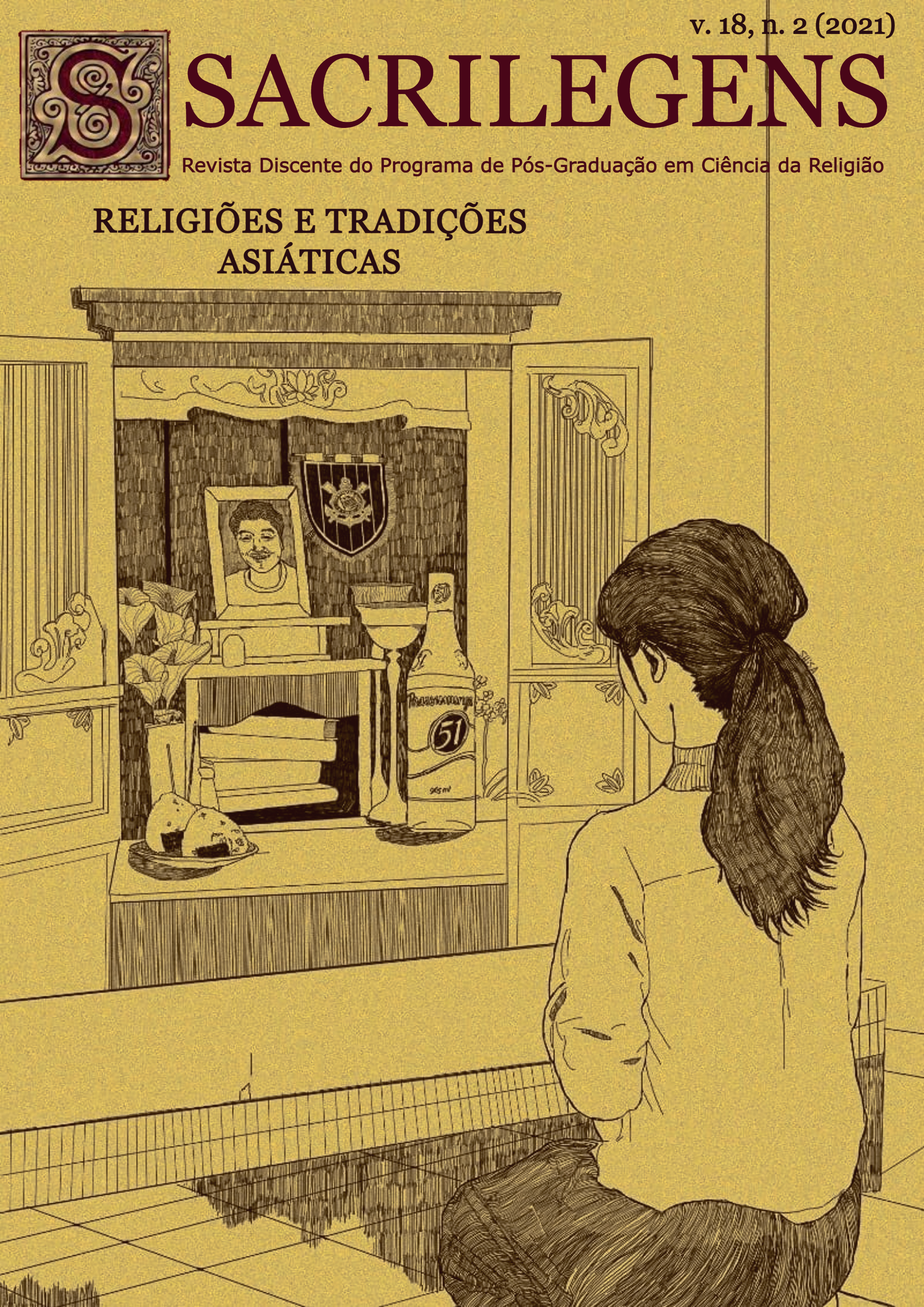O círculo sagrado dos sentidos: a abordagem tântrica de Abhinavagupta ao Bhagavad-gītā e o conceito de spanda (“pulsação”)
DOI:
https://doi.org/10.34019/2237-6151.2021.v18.35764Palabras clave:
Abhinavagupta, tantra, tradição, sentidosResumen
O objetivo do artigo é abordar algumas das imagéticas e significados atribuídos às faculdades sensoriais na tradição do Śivaísmo da Caxemira. A primeira seção analisará a leitura “tântrica” que o grande filósofo caxemíri, Abhinavagupta, realizou do Bhagavad-gītā, buscando extrair o que considerou como sendo o sentido essencial deste texto védico: a correlação entre ação sacrificial e ludicidade sensorial. A seguir, tal tópico será abordado a partir de uma dimensão intertextual mais ampla, relativa principalmente aos ensinamentos e à práxis soteriológica da escola tântrica denominada Spanda (“Pulsação”). Pensamos que a contribuição do trabalho se expressa ao tratar de textualidades que apresentam um importante contraponto conceitual à desvalorização recorrente do corpo e de sua sensorialidade no campo da Religião.
Descargas
Citas
ABHINAVAGUPTA. Gītārtha Saṁgraha. Abhinavagupta’s Commentary on the Bhagavad Gītā. Tradução: Boris Marjanovic. Varanasi: Indica Books, 2004.
ABHINAVAGUPTA. Tantrāloka. Disponível em: <https://www.sanskrit-trikashaivism.com/en/tantraloka-introduction-trika-scriptures-non-dual-shaivism-of-kashmir/581. Acesso em: 04. set. 2021
DYCSKOWSKI, Mark S. G. The Doctrine of Vibration. An Analysis of the Doctrines and Practices of Kashmir Shaivism. Delhi: Motilal Banarsidass, 1989
FIGUEROA, Oscar. El sentido “esotérico” de la Gītā: la lectura tántrica de Abhinavagupta. In: FIGUEROA, Oscar (ed.) La Bhagavad-Gītā. El clásico de la literatura sánscrita y su recepción. Ciudad de México: Universidad Nacional Autónoma de México, 2017.
FLOOD, Gavin. The Tantric Body. London: I.B.Tauris, 2006.
LOUNDO, Dilip. O ritual na tradição védica: abertura, pluralidade e teleologia. In: Gnerre, Maria Lucia. (Org.). Cultura oriental: língua, filosofia e crença. (1ed.) João Pessoa: Editora da Universidade Federal da Paraíba, 2012, p. 31-56.
LOUNDO, Dilip. A hermenêutica transformativa da Bhagavad Gītā. In: SILVESTRE, Ricardo Sousa (org.). Filosofia e teologia da Bhagavad Gītā. Hinduísmo e Vaishnavismo de Caitanya. Curitiba: Juruá, 2015, p. 65-82.
LOUNDO, Dilip. The meaningfulness of “The Meaninglessness of Ritual”: [an advaita Vedānta perspective on] Vedic ritual (yajña) as narrative of renunciation (tyāga). In: Horizonte, Belo Horizonte, v.16, n.51, set./dez. 2018, p.1152-1176.
LOUNDO, Dilip. The Indian Aesthetics of Emotions (Rasa): non-duality, aesthetic experience and the body. In: Revista Terceira Margem, Rio de Janeiro, v.25, n.46, mar./ago. 2021, p.51-66.
SANDERSON, Alexis. Śaivism and the Tantric Traditions. In: The World’s Religion. London: Routledge, 1988, p. 660-704.
SHARMA, Arvind. Abhinavagupta Gītārtha Saṅgraha. Leiden: E. J. BRILL, 1983
SINGH, Jaideva. Pratyabhijñāhḥdayam. The Secret of Self-Recognition. Delhi: Motilal Banarsidass, 2011.
SINGH, Jaideva. The Yoga of Vibration and Divine Pulsation. A translation of the Spanda Kārikās with Kṣemarāja’s Commentary, the Spanda Nirṇaya. Delhi: Motilal Banarsidass, 1992.
SINGH, Jaideva. Vijñānabhairava or Divine Cosnciousness. Delhi. Motila Banarsidass, 1979.
SKORA, Kerry Martin. The Hermeneutics of Touch: Uncovering Abhinavagupta’s Tactile Terrain. In: Method and Theory in the Study of Religion 21. Leiden: Brill, 2009, p.87-106.
WALLIS, Christopher. Tantra Illuminated. The Philosophy, History, and Practice of a Timeless Tradition. New York: Anusara Press, 2012.
Descargas
Publicado
Cómo citar
Número
Sección
Licencia
Derechos de autor 2022 Daniel Faria Ribeiro

Esta obra está bajo una licencia internacional Creative Commons Atribución 4.0.
 A Revista Sacrilegens é um periódico de acesso aberto, licenciada sob a licença Creative Commons Attribution 4.0 International
A Revista Sacrilegens é um periódico de acesso aberto, licenciada sob a licença Creative Commons Attribution 4.0 International










